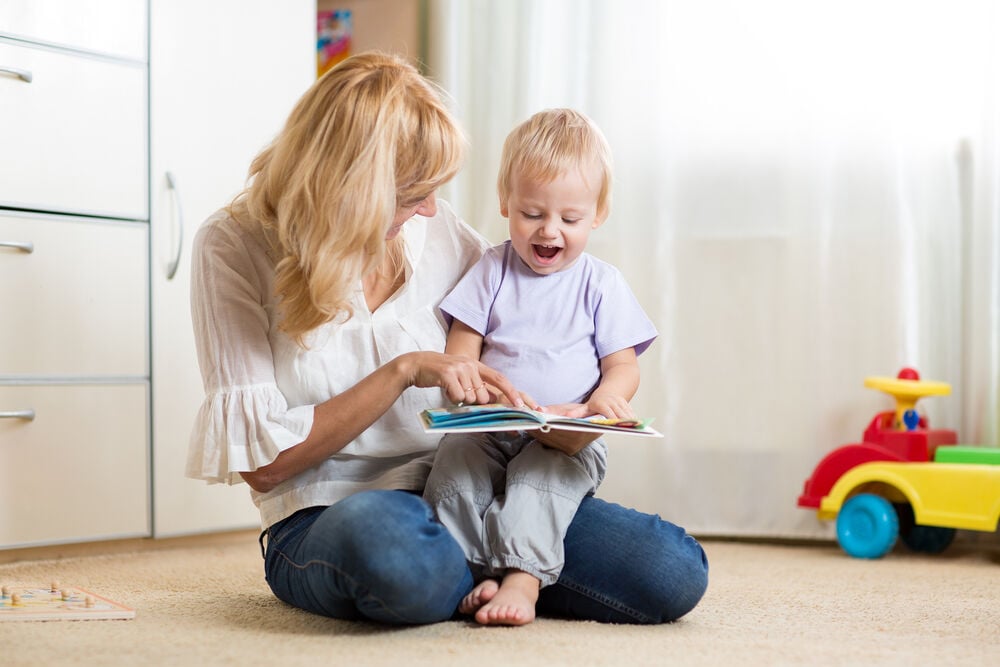Nothing matches the exhilaration of hearing your baby’s first words. The language development months can be a lot of fun — especially when you’ve been impatiently waiting for the first “mama” or “dada,” which occurs around the 9-month mark.
-
Tracking cycle
-
Getting pregnant
-
Pregnancy
-
Help Center
-
Flo for Partners
-
Anonymous Mode
-
Flo app reviews
-
Flo Premium New
-
Secret Chats New
-
Symptom Checker New
-
Your cycle
-
Health 360°
-
Getting pregnant
-
Pregnancy
-
Being a mom
-
LGBTQ+
-
Quizzes
-
Ovulation calculator
-
hCG calculator
-
Pregnancy test calculator
-
Menstrual cycle calculator
-
Period calculator
-
Implantation calculator
-
Pregnancy weeks to months calculator
-
Pregnancy due date calculator
-
IVF and FET due date calculator
-
Due date calculator by ultrasound
-
Medical Affairs
-
Science & Research
-
Pass It On Project New
-
Privacy Portal
-
Press Center
-
Flo Accuracy
-
Careers
-
Contact Us
Baby's First Words: What to Expect and When


Every piece of content at Flo Health adheres to the highest editorial standards for language, style, and medical accuracy. To learn what we do to deliver the best health and lifestyle insights to you, check out our content review principles.
Read on to find out when babies start talking and how you can support their speech development.
When do babies start talking?
Initially, your baby will start to communicate with you in words or word-sounds like “ma-ma” or “da-da.” They’ll be making short strings of consonant-vowel sounds, as this is much easier for them in the language-learning development. If they’re exposed to two languages regularly, you’ll likely hear them babbling in ways that are consistent with both languages.
Although it’s difficult to determine when exactly babies make the switch from imitating sounds to speaking meaningfully, you shouldn't worry yourself too much. The most important thing is that your baby is making sounds and attempting to communicate, which is an indication that they’ll develop their language skills adequately.
According to experts, you should expect your baby to speak meaningfully when they’re somewhere between 9–14 months. If your child still hasn’t said their first word by this time, though, don’t worry — many perfectly normal babies don’t say a word until they’re 18 months. There’s also nothing surprising about hearing your baby’s first words when they’re as young as 7 months.
As your baby learns words, you can play many games with them to speed up the learning process. Talking to your baby repeatedly and reading to them starting no later than six months will help encourage language development.
The babbling stage
The most important milestones for a baby learning to talk happen in the first 3 years of their life. But why the first 3 years? It’s because this is the time when the brain is rapidly developing. During those years, your baby’s speech development will depend as much on your baby talk skills as your baby’s!
Before babies learn to speak, they go through a babbling stage where they play with sounds. When they’re between 4 and 7 months old, you’ll hear back-of-the-tongue consonant sounds like g and k, and lip sounds like m, p, and b.
From 6 to 12 months of age, their babbling will start to sound more like words. They’ll try to repeat sounds like “da-da” and “ga-ga” over and over again, and when they reach about 10 months of age, they’ll start combining sounds and even invent their own words. Their first real word will usually appear when they’re around 12 months.
The Flo app is incredibly good. You can keep track of your cycle without any problems. Also, Flo was very helpful for conceiving. After stopping the pill, we only needed 3 exercise cycles to get pregnant, and we kept 100% on the app. We are very satisfied!
Baby's first words
Are you eagerly waiting your baby’s first words? They’ve been babbling for a few months now, and you’re looking forward to those babbles turning into real words. Who will they call for first? No matter who they call or what they say, it’s important to remember that the words will probably not be perfect.
Here’s what you can expect.
12 months. When your baby reaches 12 months, they’ll likely be saying about 1–3 words. The words will be simple and incomplete, but parents will know what they mean. Usually, they’ll try pronouncing words like “ma-ma,” “da-da,” “bye-bye,” a sibling’s name, a pet name, or the name of a toy — so get ready for a heart melt!
13–18 months. Once they succeed at getting those first words out, they’ll try for more. Their vocabulary needs to build slowly — just a few new words a month — so there’s no need to rush things. Your baby’s first words will generally be nouns, and then they’ll gradually add adjectives and verbs. For example, instead of saying “Can I have milk?,” they’ll start with one-word questions like “milk?”
19–24 months. When they reach about 18–20 months of age, something amazing happens. Linguists call it “a language explosion.” After months and months of slow progress and babbling, your baby will start to learn new words at the speed of light.
2 years. When they turn 2 years of age, they’ll begin stringing several words together to make a sentence. One half of speech will be understood by strangers and your toddler will be able to use pronouns. This might be a combination of their name or your name and a request. It can even be a question like “mama milk?” Moreover, he or she will also begin to grasp the concept of verbs.
25–30 months. Your baby’s first words will turn into complex ideas during this time, and they might start using more abstract verbs like “think” and “know.” What's more, this is the age when they start understanding tense and plurals.
3 years. When they reach 3 years of age, they’ll be able to convey entire thoughts using a few words. Instead of saying “mommy isn’t home today,” they’ll likely say something like “mommy no home.” At this point about three-quarters of speech is understood by strangers and toddlers will be able to recognize several colors. Later into the year, they’ll start speaking in longer sentences.
4–5 years. By the time they’re 4 to 5 years of age, your child will be able to have extensive conversations with adults. They’ll be able to ask questions, use adjectives, and understand about 14,000 words.
How can you help your baby start talking?

Take a quiz
Find out what you can do with our Health Assistant
Try these tips to help your baby learn to talk and follow their progress:
- Have real conversations. A joint study by Massachusetts Institute of Technology, University of Pennsylvania, and Harvard found that regular conversations with your baby can help them develop better language and comprehension skills.
- Name the things your baby loves. If your baby is playing with a giraffe, try repeating that word often. They’re more likely to learn the word for the toy that got them interested.
- Narrate. As you walk in the park or feed your child, talk regularly about what you're doing, saying something like “Look at how beautiful this park is,” “Can you hear the birds singing?” or "Let’s warm up your milk so that it’s tasty and yummy.” This will help your baby connect your speech to these objects and experiences.
- Don’t reinforce incorrect pronunciation. If your baby points to a cat and says “ca,” don’t say “That’s a ca.” Instead, what you should say is, “That’s right, that’s a cat.” Repeating your child’s shortened names for things can reinforce incorrect pronunciation.
- Read books to your child. Reading books can help them hear new words and encourage learning. You don't even have to read the words on the page, just talk about what you can see.
- Baby's first words book. You can encourage your baby’s language skills with the help of baby’s first words books that are designed to support babies' natural pattern of language development. The books contain the fundamental first words that your baby needs to master. What’s more, the amazing images on every page will encourage playful interaction with the book and help speed up your child's development.
- Play games. Playing games like peek-a-boo with your baby can encourage interaction, which fosters conversation.
- Ask plenty of questions. Although this means talking to yourself, keep in mind that you’re also setting an example of how conversations should go. Ask your child “Do you want to take a walk in the park?” and then answer your own question with “Yes, I think a walk in the park would be amazing and a fun thing to do today.”
- Sing songs. As your baby grows, sing nursery rhymes and children’s songs to them. Singing songs and dancing can help your child remember the words and encourage language development.
- Repeat words. Repetition can help your child better remember words. For example, try repeating the same word a couple of times: “Where are your shoes? Are they blue shoes? Let’s put on your blue shoes.”
Signs of speech delay
We see many babies happily babble "mama" and "dada" well before their first birthday. But what if your baby hasn’t been babbling or has been having trouble recognizing the names of common objects? How can you know if there's cause for concern when it comes to your child’s speech development?
Before you get depressed or worried, here are some indicators that can help you determine whether your child's speech is really off target for their age:
- Your child doesn’t understand simple words by the age of 15 months
- Your child doesn’t use single words by 15 to 16 months of age
- He or she can’t follow simple directions like “come here” by the time they are 21 months
- Your child is 2 years old and is still mainly babbling, not using words like “mama” or “dada”
- At 2 years old, your child is not yet able to point to a number of body parts or put two words together, like “mama ball”
If you have any concerns about your child’s speech development, don’t hesitate to talk to your pediatrician. With that said, it’s vital to remember that every child’s development is different and they will master different language skills at different ages.


Hey, I'm Anique
I started using Flo app to track my period and ovulation because we wanted to have a baby.


The Flo app helped me learn about my body and spot ovulation signs during our conception journey.


I vividly
remember the day
that we switched
Flo into
Pregnancy Mode — it was
such a special
moment.
Real stories, real results
Learn how the Flo app became an amazing cheerleader for us on our conception journey.




